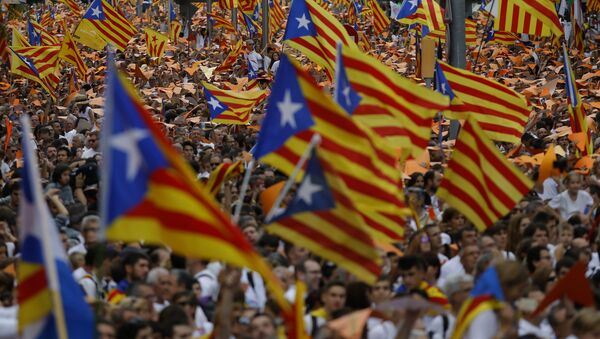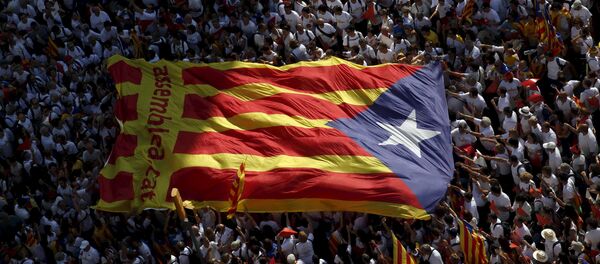MOSCOW (Sputnik) — On Sunday, September 27, Spain's Catalonia holds regional elections.
The Statute of Autonomy of Catalonia, passed on August 9, 2006, sets forth an institutional system for the region’s political self-government. The Generalitat de Catalunya is the institution in which the self-government of Catalonia is politically organized. It consists of the Parliament, the Presidium of the Generalitat and the Executive Council or Government of Catalonia and other institutions as defined by the Statute.
The Parliament representing the people of Catalonia exercises legislative power, approves the budget, encourages and monitors political and government activity.
Members of parliament are elected for a period of four years by comprehensive, free, equal, direct secret ballot in line with the proportional representation system to ensure adequate representation of all Catalonia districts.
The people of Catalonia have the status of voters in full conformity with their civil and political rights and election legislation, and they can also be elected.
Under Article 56 of the Statute, the Parliament may consist of not less than 100 and not more than 150 deputies. Currently, the number of deputies is 135.
The election districts are located in four provinces, part of Catalonia. Eighty-five members of parliament are elected in Barcelona, 18 in Tarragona, 17 in Gerona and 15 in Lleida.
The President of the Generalitat shall appoint an election 15 days prior to the expiry of the legislature’s authority, and the elections shall take place 40-60 days from the date they are announced.
Spanish citizens of 18 years and older having the status of Catalonia residents, registered during municipal censuses and included in voter lists have the right to take part in elections. Spanish citizens living abroad who have legitimate status as Catalonia residents and who can prove this at the appropriate Spanish consulate can also vote.
The elections involve the lists of candidates categorized by election bloc, and voters have no right to add new candidates to their ballots. At least 3 percent of votes that are recognized valid in a relevant district are needed to be represented in Parliament.
Apart from political parties, the so-called groups of voters have the right to nominate prospective members of Parliament. Their candidacies shall be submitted with the signatures of at least 1 percent of voters registered in any specific election district.
During the 15-day election campaign, campaign posters are placed free of charge in areas reserved for this purpose. The Government of Catalonia can finance part of a candidate’s campaign expenses, as with nationwide elections to the Congress of Deputies and the Senate. It also stipulates special rates for using the postal service in campaign. During the election campaign, all parties, federations, coalitions and groups have the right to broadcast in state-owned media outlets without charge.
Polling stations are open from 9 a.m. (07:00 GMT) through 8 p.m. local time (18:00 GMT). While registering at polling stations, voters need to present copies of their passports or driver’s licenses, provided that the documents contain a photo.
Voting is always personal. Nevertheless, those voters who are unable to show up for some reason can cast their ballots via an authorized representative.
The Parliament shall be formed 20 days after the election, and the deadline is determined by an executive order of the President of the Generalitat.
The organization and operation of the Parliament of Catalonia is modeled after the organization of the Spanish Parliament. The Parliament has its own President, Governing Council and Permanent Commission. Members of the parliament are involved in the work of plenary meetings and commissions representing all deputy groups.



